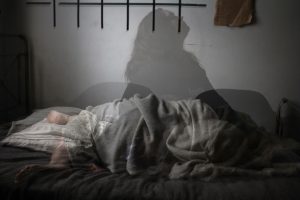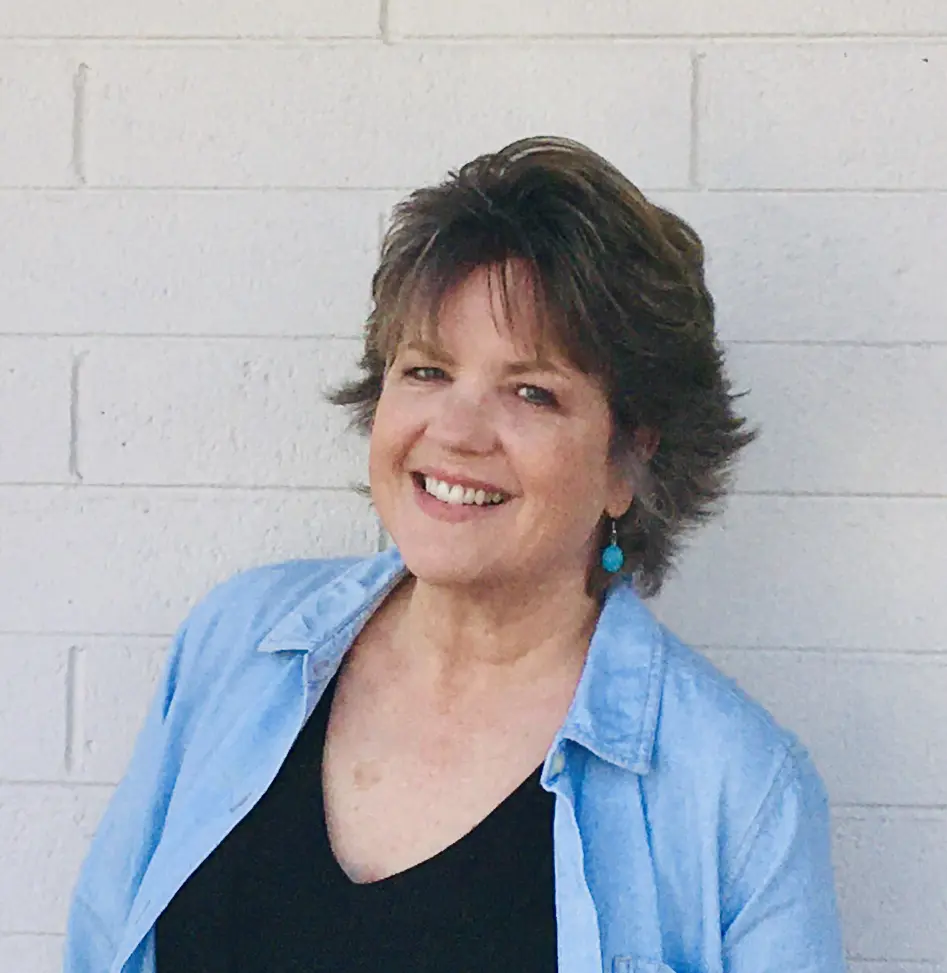“Insomnia for trauma survivors is not a sleep problem, it is an anxiety problem.”
My story
For decades, I stayed up nearly all night until exhaustion forced me to pass out the next day. My brain interpreted the setting of the sun as a cue to churn. Sometimes I could last as long as 4 AM. Other times I’d finally pass out around 2. Waking multiple times in the night, nightmares, and panic attacks were all part of the cycle. During the day, if I got quiet or sat down to read or watch TV, I would fall asleep. I felt as though I lived in a permanent fog or jet lag.
Looking back, the more trauma symptoms reared their ugly head, the worse insomnia symptoms grew. The two things required for sleep, relaxation and letting go of control, are two things trauma survivors do not do. As trauma pushes to the surface demanding to be processed, sleep becomes an adversary.
I began to dread going to bed. I knew what was waiting. Lying awake hour after hour, sifting through thoughts about the past, churning over regret, being afraid, grieving. My body would hurt. I could not get comfortable. My head ached. Sometimes I would pace the floor or go outside and listen to the night. Nothing helped. When you are sleep deprived AND exhausted you can’t coherently cope with anything.
As a child, my brain was in overdrive. For my own survival, I was always on the alert for threats. This same pattern is responsible, at least in large part, for insomnia. As an adult, my brain continued to be devoted to ferreting out threats. And in response to the neural pathways laid down in childhood, I trained myself to be an insomniac. This is the repetitive catch-22 trap of trauma. Just like dissociation, just like flashbacks, just like a perceived threat, what my brain does to try to help (looking for a threat) keeps me awake night after a sleepless night.

Common beliefs insomniacs have about sleep
- Worry over sleep loss
- My brain is broken. There is something wrong with me.
- What am I going to do if I can’t sleep?
- I’m going to die from lack of sleep.
2. Rumination over consequences
- I’m going to have to cancel everything tomorrow.
- I won’t be able to go on that trip. My insomnia makes it impossible.
3. Unrealistic expectations
- I have to have eight hours of uninterrupted sleep.
- I’m going to stay in this bed until I go to sleep. I don’t care if I stay awake all night.
- I’m going to force myself to fall asleep.
In addition, trauma survivors hold these beliefs when approaching sleep.
- Worry
- As soon as I lay down, my brain is going to bring up the past, over and over and over.
- Rumination and worry over something I said or did during the previous day.
- Worry over a to-do list.
2. Fear
- What if everything my abuser said is true? Or worse, what if they come after me?
- I’m going to get in trouble.
3. Anxiety
- Something terrible is going to happen.
4. Flight
- I’m trapped.
5. Fight
- I’ve got to do something about sleep, but it’s hopeless!
And so, the circular motion of insomnia continues, and, like a hamster, I keep running around my wire track going nowhere, accomplishing nothing. If I want to conquer insomnia, I’m going to have to step off this hateful little track and do something different.
Hyper-arousal overrides the sleep drive
Hyper-arousal & Insomnia
Hyper-arousal is a primary symptom of CPTSD or Complex Post Traumatic Stress Disorder. One of a host of symptoms for long-term childhood trauma survivors, hyper-arousal is one of the main things driving insomnia. Hyper-arousal occurs when a person’s body suddenly kicks into high alert as a result of past trauma. Also known as the symptoms of fight, flight, or fawn, hyper-arousal is an automatic response. Even though there may be no present danger, pathways laid down in the early years of life continue to operate. (Please note that hypo-arousal includes the freeze response.) Let me begin with a story from my childhood.
My brother and I were excited because it was Saturday, our favorite day of the week. Saturday morning cartoons, pancakes for breakfast, and time to play with our best friends, Julie and Sally Smith. The same age as we were, they lived across the road and were kind and fun to be with. Julie and Sally were the oldest of five siblings, and their parents were always welcoming. Their family was an oasis of peace, unlike my family which was a sea of constant threat.
Surrounded by broad fields of tobacco curing in the hot Virginia sun, Julie and Sally’s house was not far from our own. Their parents were sharecroppers and, as children, Julie and Sally worked in the fields alongside their parents harvesting tobacco that gave their family the right to live in an old shack and enough money for food until the next planting season but not much else.
The neighbors often whispered about the Smith family’s poverty behind their backs. “At least they keep the kids clean,” I heard one of my mother’s acquaintances say. Poverty did not keep the Smith family from being kind to my brother and me. We loved them and we loved their pitiful broken-down old house and their equally broken-down yard dog that always wagged its tail in greeting.
We played all afternoon at Julie and Sally’s house that long-ago Saturday. Our toes were as brown as the dust of their yard by the time the sun began to set. Knowing we would get in trouble if we stayed away too long, my brother and I hopped on our bikes and followed the dirt road next to the railroad tracks heading toward home.
“What is that?” I shouted as I slowed down. My brother’s eyes followed the point of my finger. There in the center of the tracks lay a lump of unmoving black fur.
“It’s an animal,” my brother yelled.
A terrible sinking feeling hit my stomach. Too distraught to work the pedals, I got off my bike and pushed as tears began streaming down my face. My brother followed suit. I knew without getting any closer that the animal lying on that track was our beloved English Shepherd, Smut, and I knew instinctively that she was dead.
A blood-curdling scream left my brother’s throat. “Smut!” he cried in despair—gulping tremulous breaths of air between shouts. “It’s Smut.”
I joined in with his howls. We stood there screaming the screams of childhood panic and sorrow for several minutes neither of us daring to approach our precious friend. Poor old Smut. Such an awful name for such a wonderful dog, but that was how my mother did things.
“That dog is as black as the smut left by the ashes in the fireplace,” she said when Smut arrived as a puppy. We children were not allowed to name her. My mother alone had that honor.
Faithful and true, Smut would lean against you as you sat on the front steps, her brown eyes filled with empathy as you related your troubles. Good old Smut who never did my brother or me a bad turn. In a family filled with threat and turmoil, she had been our only ally. Lying dead less than a mile away from home, it never entered our minds to call out to our parents. They were the last place we would have gone to for help.
Pushing our bikes, we finally made it to the house, the loveliness of summertime wildflowers obscured by our tears. Emotionless, my mother sent my father to get Smut’s body. He took a shovel and loaded her into his truck and brought her home. She told him to bury her underneath the willow tree in the front yard. It was the only empathy I ever saw my mother express, and it was reserved for the dog, not for us.
Filled with theories of what had happened, my mother offered her opinion. “She probably had a heart attack.”
My father was annoyed. “It’s just a dog. You kids stop crying or you’ll get a whipping.”
Always made to be the problem, I looked at my brother and bit my lip. We both hid our tears, but neither of us ever got over the death of our beloved pet. Our childhood was filled with being ignored or being punished. You never knew which was coming next. When we told Julie and Sally about Smut, they stood beside us under the willow tree and wept. Our parents never noticed.
Childhood trauma is not about one incident. It’s not even about overt abuse. It’s not about normal parental mistakes or ordinary human frailty. It’s about feeling terrorized and confused every waking moment of every single day.
“For childhood trauma survivors, the root of insomnia is found in the arousal system.”
For childhood trauma survivors, the root of insomnia is found in the arousal system. We are all wired to have an arousal response. This system is part of your ‘threat scanner’ that alerts the brain and body there’s a need for a fight, flight (or freeze) response to help you in situations of danger or threat. If the arousal system ‘stays on’ it can impede sleep and can take the form of physiological arousal (difficulty relaxing), cognitive arousal (racing thoughts), or conditioned response (learned response).
To find concrete ways to conquer insomnia read my blog entitled “How Trauma Survivors Can Conquer Insomnia.” To receive a free downloadable and printable ebook about insomnia, go to my website: defytraumaembracejoy.com. Sign up for my newsletter while you’re there! You can also email me to request the insomnia packet using my website.
In Part 2 of this series, which publishes on March 15th, I will examine three key issues:
1) What Childhood Trauma Teaches Us
2) CPTSD & Insomnia
3) The role of the Amygdala in insomnia
Guest Post Disclaimer: Any and all information shared in this guest blog post is intended for educational and informational purposes only. Nothing in this blog post, nor any content on CPTSDfoundation.org, is a supplement for or supersedes the relationship and direction of your medical or mental health providers. Thoughts, ideas, or opinions expressed by the writer of this guest blog post do not necessarily reflect those of CPTSD Foundation. For more information, see our Privacy Policy and Full Disclaimer.

Rebekah Brown, a native of the south, now resides in the Great American West. Surviving a complicated and abusive family system makes her unique writing style insightful as well as uplifting. Rebekah is the proud mother of two and grandmother of four.





Thank you for this informative article; since I began actively working my PTSD issues, my insomnia has increased. I am encouraged to keep working and find proactive solutions!
Thank u. I too am processing my shit. Ex trauma safe now tell my f@! Brain to go t F ! To sleep. I’m waking my Mum. …. I have psychotic breaks; once in a while usually acceptable non stop tears etc howl cries like a battle cry. Silent is ideal. Seeing shit video ( not literal) internal loop. Replaying my shit. Every SURVIVOR whether a.c.e or neglect or hidings. Im none im neglect from NZ cyfs. Child youth and family! Family! They wanted me.. banned by law, limited time from 1 hrs a month to every Friday night to Monday morning. Beinh home was great. I actually slep more than 3 to 4 .25. Hrs. Night terrors ASD lack of melatonin cyf refused my medicine 4 sleep. Fosters just flat out refused to ask. Cyf. Lest they have to pay out of their own pocket. I wasn’t wanted by fosters. The paycheck was. I’m HOME with Mum
I had behavioral problems anxiety ASd almost normal IQ. (ASD 2 1 is good 3 is preverbal. Autisim is mute or baby talk or speech therapy or talking device or picture cards. ) trauma means if I’m angry I’m psychotic rage sadness equals grief. ASD emotional issues plus Mummy issues. I’d play my fave song with base pretending it was Mums heart. My foster parents shut me in my room 4 hours after-school. Or doing farm chores despite fatigue. You don’t work u don’t eat. Dead chickens and rotten eggs were my jobs from 8 up. I’d get a Shaken fist in my face if I dropped an egg in the house. I’m in talk therapy. She diagnosed me ASD. Anxiety. Ptsd. Seeing Mum 1 hour a month for 2 : .0.25 years. Grief. Confusion . Was it my tantrums? Is mummy allowed Now? Come get me! 8 .75 access is 1 . 0.25 hrs. 15.75. A two and a half 32 hrs stay. Night terrors after foster parent text last year. Screamed at 4am. Was yelling turn it off wasn’t an alarm was me. I heard ( outside of myself) my scream.
C.P.S IN USA 😳 CYf in NZ
I’m so sorry about the loss of your pup. Great article.